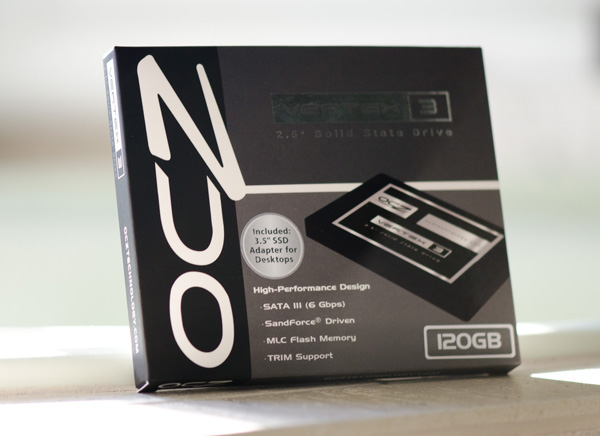The OCZ Vertex 3 Review (120GB)
by Anand Lal Shimpi on April 6, 2011 6:32 PM ESTFinal Words
This is going to be a pretty frustrating conclusion to write. I'm still waiting for the final, shipping 240GB Vertex 3 to arrive before passing judgement on it but from what I've seen thus far it looks like that may be the drive to get if you're torn between the two. I feel like if you're going to be working with a lot of incompressible data (e.g. pictures, movies) on your drive then you'll want to either go for the 240GB version or perhaps consider a more traditional controller. The performance impact the 120GB sees when working with incompressible data just puts it below what I would consider the next-generation performance threshold.
The bigger question is how does the 120GB Vertex 3 stack up against similar capacity drives from the competition? Unfortunately with only a 300GB Intel SSD 320, a 250GB Intel SSD 510 and a 256GB Crucial m4 on hand it's really tough to tell. I suspect that the drive will still come out on top given that the rest incur a performance penalty as well when going to smaller capacities, but I don't know that the performance drop is proportional across all of the controllers. I hate to say it but you may want to wait a few more weeks for us to get some of these smaller capacity drives in house before making a decision there.
It's clear to me that these SF-2000 based drives are really best suited for use with a 6Gbps interface. Performance over 3Gbps is admirable but it's just not as impressive. If you've got an existing SF-1200 drive (or similar performing drive) on a 3Gbps system, I don't believe the upgrade to a SF-2200 is worth it until you get a good 6Gbps controller.











153 Comments
View All Comments
pfarrell77 - Sunday, April 10, 2011 - link
Great job Anand!ARoyalF - Wednesday, April 6, 2011 - link
For keeping them honest!magreen - Wednesday, April 6, 2011 - link
Intro page: "It's also worth nothing that 3000 cycles is at the lower end for what's industry standard..."I can't figure out your intent here. Is it worth noting or is it worth nothing?
Anand Lal Shimpi - Wednesday, April 6, 2011 - link
Noting, not nothing. Sorry :)Take care,
Anand
magreen - Wednesday, April 6, 2011 - link
Hey, it was nothing.:)
vol7ron - Wednesday, April 6, 2011 - link
Lmao. Magreen, I like how you addressed that.Shark321 - Thursday, April 7, 2011 - link
On many workstations in my company we have a daily SSD usage of at least 20 GB, and this is not something really exceptional. One hibernation in the evening writes 8 GB (the amount of RAM) to the SSDs. And no, Windows does not write only the used RAM, but the whole 8 GB. One of the features of Windows 8 will be that Windows does not write the whole RAM content when hibernating anymore. Windows 7 disables hibernation by default on system with >4GB of RAM for that very reason! Several of the workstation use RAM-Disks, which write a 2 or 3 GB Images on Shutdown/Hibernate. Since we use VMWare heavily, 1-2 GB is written contanstly all over the day as Spanshots. Add some backup spanshops of Visual Studio products to that and you have another 2 GB.Writing 20 GB a day, is nothing unusual, and this happens on at least 30 workstations. Some may even go to 30-40 GB.
Only 3000 write cycles per cell is the reason why we had several complete failures of SSDs. Three of them from OCZ, one Corsair, one Intel.
Pessimism - Thursday, April 7, 2011 - link
Yours is a usage scenario that would benefit more from running a pair of drives, one SSD and one large conventional hard drive. The conventional drive could be used for all your giant writes (slowness won't matter because you are hitting shut down and walking away) and use the SSD for windows and applications themselves.Shark321 - Friday, April 8, 2011 - link
HDD slowness does matter! A lot! Loading a VMWare snapshot on a Raptor HDD takes at least 15 seconds, compared to about 6-8 with a SDD. Shrinking the image once a month takes about 30 minutes on a SDD and 3 hours on a HDD!Since time is money, HDDs are not an option, except as a backup medium.
Per Hansson - Friday, April 8, 2011 - link
How can you be so sure it is due to the 20GB writes per day?If you run out of NAND cycles the drives should not fail (as I'm implying you mean by your description)
When an SSD runs out of write cycles you will have (for consumer drives) if memory serves about one year before data retention is no longer guaranteed.
What that means is that the data will be readable, but not writeable
This of course does not in any way mean that drives could not fail in any other way, like controller failure or the likes
Intel has a failure rate of ca 0.6% Corsair ca 2% and OCZ ca 3%
http://www.anandtech.com/show/4202/the-intel-ssd-5...